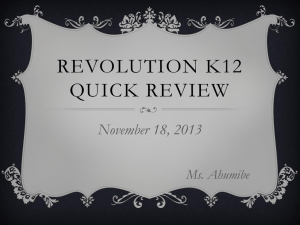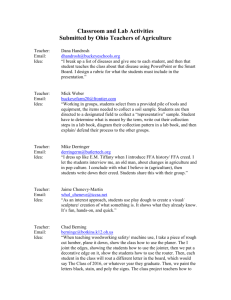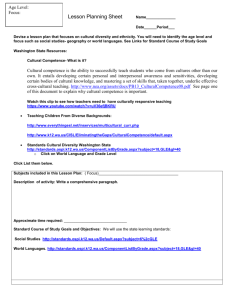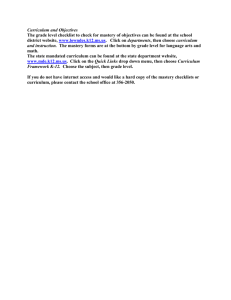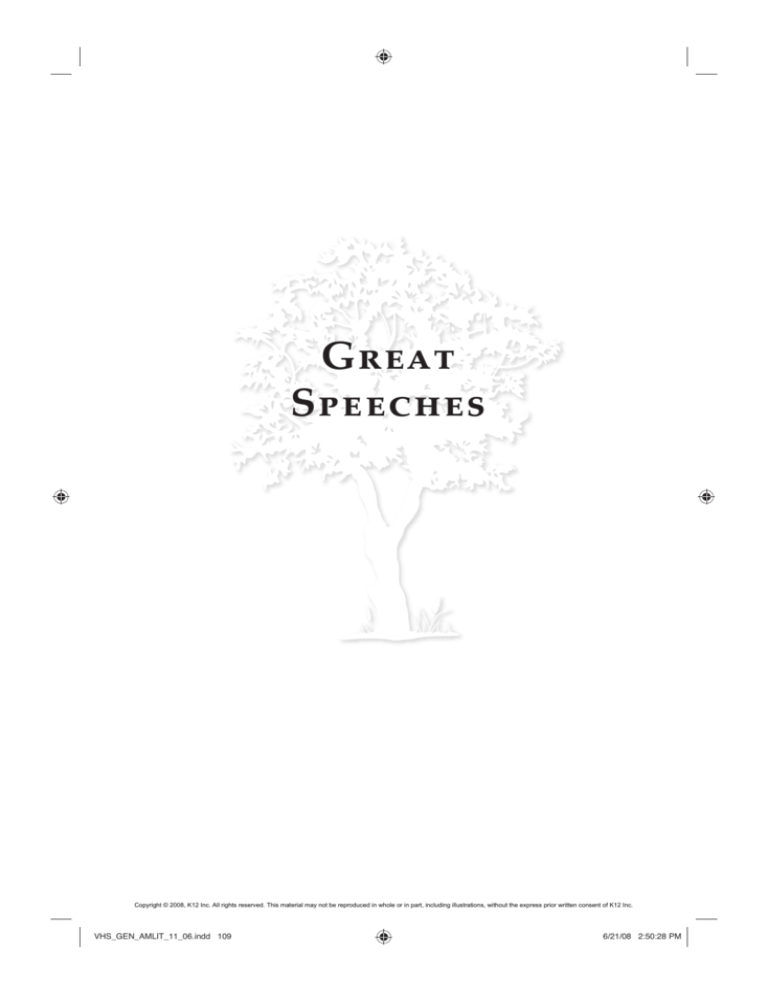
Gџђюѡ
SѝђђѐѕђѠ
Copyright © 2008, K12 Inc. All rights reserved. This material may not be reproduced in whole or in part, including illustrations, without the express prior written consent of K12 Inc.
VHS_GEN_AMLIT_11_06.indd 109
6/21/08 2:50:28 PM
Tѕђ GђѡѡѦѠяѢџє AёёџђѠѠ
An address delivered by President Abraham Lincoln
at the dedication of the Cemetery at Gettysburg, November 19, 1863
Four score and seven years ago our fathers brought forth on this
continent, a new nation, conceived in Liberty, and dedicated to the
proposition that all men are created equal.
Now we are engaged in a great civil war, testing whether that
nation, or any nation so conceived and so dedicated, can long
endure. We are met on a great battle-field of that war. We have
come to dedicate a portion of that field, as a final resting place for
those who here gave their lives that that nation might live. It is
altogether fitting and proper that we should do this.
But, in a larger sense, we can not dedicate—we can not
consecrate—we can not hallow—this ground. The brave men, living
and dead, who struggled here, have consecrated it, far above our
poor power to add or detract. The world will little note, nor long
remember what we say here, but it can never forget what they
did here. It is for us the living, rather, to be dedicated here to the
unfinished work which they who fought here have thus far so
nobly advanced. It is rather for us to be here dedicated to the great
task remaining before us—that from these honored dead we take
increased devotion to that cause for which they gave the last full
measure of devotion—that we here highly resolve that these dead
shall not have died in vain—that this nation, under God, shall have
a new birth of freedom—and that government of the people, by the
people, for the people, shall not perish from the earth.
four score: 80 (one score is equal to 20)
proposition: a statement of an idea or principle; a proposal
endure: to last; to continue to exist despite hardships
consecrate: to declare as sacred
hallow: to make holy; to set apart as worthy of reverence
detract: to lessen; to take away from
resolve: to form a purpose; to make a firm decision
110
Copyright © 2008, K12 Inc. All rights reserved. This material may not be reproduced in whole or in part, including illustrations, without the express prior written consent of K12 Inc.
VHS_GEN_AMLIT_11_06.indd 110
6/21/08 2:50:30 PM
I Hюѣђ ю Dџђюњ
A speech delivered by the Reverend Martin Luther King, Jr.,
on the steps of the Lincoln Memorial in Washington, D.C.,
August 28, 1963
I am happy to join with you today in what will go down in history as
the greatest demonstration for freedom in the history of our nation.
Five score years ago, a great American, in whose symbolic
shadow we stand today, signed the Emancipation Proclamation.
This momentous decree came as a great beacon light of hope to
millions of Negro slaves who had been seared in the flames of
withering injustice. It came as a joyous daybreak to end the long
night of their captivity.
But one hundred years later, the Negro still is not free. One
hundred years later, the life of the Negro is still sadly crippled by
the manacles of segregation and the chains of discrimination. One
hundred years later, the Negro lives on a lonely island of poverty
in the midst of a vast ocean of material prosperity. One hundred
years later, the Negro is still languished in the corners of American
society and finds himself an exile in his own land. And so we’ve
come here today to dramatize a shameful condition.
In a sense we’ve come to our nation’s capital to cash a check.
When the architects of our republic wrote the magnificent words of
the Constitution and the Declaration of Independence, they were
signing a promissory note to which every American was to fall
five score: 100 (one score is equal to 20)
Emancipation Proclamation: a document signed during the Civil War in 1862 by
President Abraham Lincoln, freeing the slaves in the Confederacy
decree: an order; a command
seared: burned
withering: devastating
manacles: metal rings and chains used to confine a person’s hands
languished: left neglected and in a miserable state
promissory note: a written promise for a future payment; a binding agreement
111
Copyright © 2008, K12 Inc. All rights reserved. This material may not be reproduced in whole or in part, including illustrations, without the express prior written consent of K12 Inc.
VHS_GEN_AMLIT_11_06.indd 111
6/21/08 2:50:30 PM
heir. This note was a promise that all men—yes, black men as well
as white men—would be guaranteed the unalienable rights of life,
liberty, and the pursuit of happiness.
It is obvious today that America has defaulted on this promissory note insofar as her citizens of color are concerned. Instead
of honoring this sacred obligation, America has given the Negro
people a bad check, a check that has come back marked “insufficient funds.”
But we refuse to believe that the bank of justice is bankrupt. We
refuse to believe that there are insufficient funds in the great vaults
of opportunity of this nation. And so we’ve come to cash this check,
a check that will give us upon demand the riches of freedom and
security of justice.
We have also come to this hallowed spot to remind America of
the fierce urgency of now. This is no time to engage in the luxury
of cooling off or to take the tranquilizing drug of gradualism.
Now is the time to make real the promises of democracy. Now
is the time to rise from the dark and desolate valley of segregation to the sunlit path of racial justice. Now is the time to lift our
nation from the quicksands of racial injustice to the solid rock of
brotherhood. Now is the time to make justice a reality for all of
God’s children.
It would be fatal for the nation to overlook the urgency of the
moment. This sweltering summer of the Negro’s legitimate discontent will not pass until there is an invigorating autumn of freedom
and equality. Nineteen sixty-three is not an end but a beginning.
Those who hoped that the Negro needed to blow off steam and will
now be content will have a rude awakening if the nation returns
to business as usual. There will be neither rest nor tranquility in
America until the Negro is granted his citizenship rights. The
whirlwinds of revolt will continue to shake the foundations of our
nation until the bright day of justice emerges.
unalienable: incapable of being taken away
defaulted: failed to meet an obligation; failed to make a payment
hallowed: holy; sacred
gradualism: moving toward a goal through a series of small steps; little by little
desolate: dismal; dreary; forsaken
invigorating: filling with strength or energy
112
Copyright © 2008, K12 Inc. All rights reserved. This material may not be reproduced in whole or in part, including illustrations, without the express prior written consent of K12 Inc.
VHS_GEN_AMLIT_11_06.indd 112
6/21/08 2:50:30 PM
But there is something that I must say to my people who stand
on the warm threshold which leads into the palace of justice. In
the process of gaining our rightful place we must not be guilty of
wrongful deeds. Let us not seek to satisfy our thirst for freedom by
drinking from the cup of bitterness and hatred. We must forever
conduct our struggle on the high plane of dignity and discipline.
We must not allow our creative protest to degenerate into physical
violence. Again and again we must rise to the majestic heights of
meeting physical force with soul force. The marvelous new militancy which has engulfed the Negro community must not lead us
to a distrust of all white people, for many of our white brothers, as
evidenced by their presence here today, have come to realize that
their destiny is tied up with our destiny. And they have come to
realize that their freedom is inextricably bound to our freedom. We
cannot walk alone.
And as we walk, we must make the pledge that we shall always
march ahead. We cannot turn back. There are those who are asking
the devotees of civil rights, “When will you be satisfied?” We can
never be satisfied as long as the Negro is the victim of the unspeakable horrors of police brutality. We can never be satisfied as long as
our bodies, heavy with the fatigue of travel, cannot gain lodging in
the motels of the highways and the hotels of the cities. We cannot
be satisfied as long as the Negro’s basic mobility is from a smaller
ghetto to a larger one. We can never be satisfied as long as our
children are stripped of their selfhood and robbed of their dignity
by signs stating “for whites only.” We cannot be satisfied as long
as a Negro in Mississippi cannot vote and a Negro in New York
believes he has nothing for which to vote. No, no we are not satisfied and we will not be satisfied until justice rolls down like waters
and righteousness like a mighty stream.
I am not unmindful that some of you have come here out of
great trials and tribulations. Some of you have come fresh from
narrow jail cells. Some of you have come from areas where your
degenerate: to decline; to sink to a lower state
militancy: an aggressive, fighting spirit or attitude
inextricably: inseparably
unmindful: not attentive; unaware
tribulations: suffering; great troubles
113
Copyright © 2008, K12 Inc. All rights reserved. This material may not be reproduced in whole or in part, including illustrations, without the express prior written consent of K12 Inc.
VHS_GEN_AMLIT_11_06.indd 113
6/21/08 2:50:30 PM
quest for freedom left you battered by storms of persecution and
staggered by the winds of police brutality. You have been the
veterans of creative suffering. Continue to work with the faith that
unearned suffering is redemptive.
Go back to Mississippi, go back to Alabama, go back to
South Carolina, go back to Georgia, go back to Louisiana, go back
to the slums and ghettos of our northern cities, knowing that
somehow this situation can and will be changed.
Let us not wallow in the valley of despair. I say to you today
my friends—so even though we face the difficulties of today and
tomorrow, I still have a dream. It is a dream deeply rooted in the
American dream.
I have a dream that one day this nation will rise up and live
out the true meaning of its creed: “We hold these truths to be selfevident, that all men are created equal.”
I have a dream that one day on the red hills of Georgia the sons
of former slaves and the sons of former slave owners will be able to
sit down together at the table of brotherhood.
I have a dream that one day even the state of Mississippi, a
state sweltering with the heat of injustice, sweltering with the heat
of oppression, will be transformed into an oasis of freedom and
justice.
I have a dream that my four little children will one day live in a
nation where they will not be judged by the color of their skin but
by the content of their character.
I have a dream today.
I have a dream that one day down in Alabama, with its vicious
racists, with its governor having his lips dripping with the words
of interposition and nullification—one day right there in Alabama
little black boys and black girls will be able to join hands with little
white boys and white girls as sisters and brothers.
I have a dream today.
redemptive: tending to redeem—that is, to save, rescue, or liberate
interposition: the act of a state putting itself between the federal government and its
citizens
nullification: the action of a state attempting to prevent the enforcement of a
U.S. law within its borders
114
Copyright © 2008, K12 Inc. All rights reserved. This material may not be reproduced in whole or in part, including illustrations, without the express prior written consent of K12 Inc.
VHS_GEN_AMLIT_11_06.indd 114
6/21/08 2:50:30 PM
I have a dream that one day every valley shall be exalted, and
every hill and mountain shall be made low, the rough places will be
made plain, and the crooked places will be made straight, and the
glory of the Lord shall be revealed and all flesh shall see it together.
This is our hope. This is the faith that I go back to the South
with. With this faith we will be able to hew out of the mountain of
despair a stone of hope. With this faith we will be able to transform
the jangling discords of our nation into a beautiful symphony of
brotherhood. With this faith we will be able to work together, to
pray together, to struggle together, to go to jail together, to stand
up for freedom together, knowing that we will be free one day.
This will be the day, this will be the day when all of God’s
children will be able to sing with new meaning, “My country ‘tis
of thee, sweet land of liberty, of thee I sing. Land where my fathers
died, land of the Pilgrim’s pride, from every mountainside, let
freedom ring!”
And if America is to be a great nation, this must become
true. And so let freedom ring from the prodigious hilltops of
New Hampshire. Let freedom ring from the mighty mountains of
New York. Let freedom ring from the heightening Alleghenies of
Pennsylvania.
Let freedom ring from the snow-capped Rockies of Colorado.
Let freedom ring from the curvaceous slopes of California.
But not only that: Let freedom ring from Stone Mountain of
Georgia.
Let freedom ring from Lookout Mountain of Tennessee.
Let freedom ring from every hill and molehill of Mississippi.
From every mountainside, let freedom ring.
And when this happens, and when we allow freedom [to]
ring—when we let it ring from every village and every hamlet,
prodigious: extremely impressive; causing amazement
Alleghenies: a mountain range that runs from northern Pennsylvania to southern
Virginia
Stone Mountain: a massive granite mountain with a monument to those
Confederate soldiers who died during the Civil War
Lookout Mountain: a mountain on the border of Tennessee, Georgia, and Alabama
that was the site of a famous Civil War battle
hamlet: a small village
115
Copyright © 2008, K12 Inc. All rights reserved. This material may not be reproduced in whole or in part, including illustrations, without the express prior written consent of K12 Inc.
VHS_GEN_AMLIT_11_06.indd 115
6/21/08 2:50:30 PM
from every state and every city, we will be able to speed up that
day when all of God’s children—black men and white men, Jews
and Gentiles, Protestants and Catholics—will be able to join hands
and sing in the words of the old Negro spiritual: “Free at last! Free
at last! Thank God Almighty, we are free at last!”
Gentiles: non-Jewish people
116
Copyright © 2008, K12 Inc. All rights reserved. This material may not be reproduced in whole or in part, including illustrations, without the express prior written consent of K12 Inc.
VHS_GEN_AMLIT_11_06.indd 116
6/21/08 2:50:30 PM
Iћёђѥ ќѓ AѢѡѕќџѠ юћё TіѡљђѠ
“After Twenty Years,” 5
Jackson, Shirley, 15
Angelou, Maya, 46
King, Jr., Martin Luther, 111
“Any Human to Another,” 105
“Life Is Fine,” 100
Baker, Russell, 37
Barrio Boy (excerpt), 32
Life on the Mississippi (excerpt:
“A Cub Pilot”), 26
“Black Man Talks of Reaping, A,” 104
Lincoln, Abraham, 110
Bontemps, Arna, 104
Longfellow, Henry Wadsworth, 60
Brooks, Gwendolyn, 61
“Lottery, The,” 15
“Chicago,” 70
“Man Said to the Universe, A,” 66
Chopin, Kate, 2
McKay, Claude, 107
Clemens, Samuel Langhorne
(Mark Twain), 26
“Mending Wall,” 63
Crane, Stephen, 65, 66, 67, 68, 69
“Negro Speaks of Rivers, The,” 62
“Cub Pilot, A” (excerpt from Life on the
Mississippi), 26
“No Gumption” (excerpt from
Growing Up), 37
Cullen, Countee, 105
“Rainy Day, The,” 60
Dickinson, Emily, 91, 92, 93, 94
Sandburg, Carl, 70, 72
“Dream Variations,” 99
“Secret Life of Walter Mitty, The,” 9
Dunbar, Paul Laurence, 96, 97
“Snow-Storm, The,” 89
Emerson, Ralph Waldo, 89
Song of Myself (excerpts), 74
“Fame Is a Bee,” 94
“Story of an Hour, The,” 2
Frost, Robert, 63
“Sympathy,” 97
Galarza, Ernesto, 32
“There Was Crimson Clash of War,” 69
“Gettysburg Address, The,” 110
Thoreau, Henry David, 83
“Grass,” 72
Thurber, James, 9
Growing Up (excerpt: “No Gumption”), 37
“To the Maiden,” 65
Henry, O., 5
“Tropics in New York, The,” 107
Hughes, Langston, 62, 98, 99, 100, 102
Twain, Mark, 26
“I Have a Dream,” 111
Walden, or Life in the Woods (excerpt:
“Walden Pond”), 83
I Know Why the Caged Bird Sings
(excerpt), 46
“Narrow Fellow in the Grass, A,” 92
“I Saw a Man Pursuing the Horizon,” 68
“Walden Pond” (excerpt from Walden, or
Life in the Woods), 83
“I, Too,” 98
“We Real Cool,” 61
“I Walked in a Desert,” 67
“We Wear the Mask,” 96
“I’m Nobody! Who Are You?,” 93
“Weary Blues, The,” 102
“It Sifts from Leaden Sieves,” 91
Whitman, Walt, 74
117
Copyright © 2008, K12 Inc. All rights reserved. This material may not be reproduced in whole or in part, including illustrations, without the express prior written consent of K12 Inc.
VHS_GEN_AMLIT_11_BM.indd 117
6/21/08 2:52:07 PM
Acknowledgments
“The Secret Life of Walter Mitty” by James Thurber, copyright 1933, 1961 by James
Thurber. Reprinted by arrangement with Rosemary Thurber and the Barbara Hogenson
Agency, Inc. All rights reserved.
“The Lottery” by Shirley Jackson from THE LOTTERY AND OTHER STORIES by
Shirley Jackson, copyright 1948, 1949 by Shirley Jackson. Copyright renewed 1976, 1977
by Laurence Hyman, Barry Hyman, Mrs. Sarah Webster, and Mrs. Joanne Schnurer.
Reprinted by permission of Farrar, Strauss and Giroux, LLC.
Excerpt from BARRIO BOY by Ernesto Galarza. Copyright 1971 by the University of
Notre Dame Press. Reprinted with permission.
“No Gumption” by Russell Baker from GROWING UP by Russell Baker, copyright 1982
by Russell Baker. Reprinted by permission of Don Congdon Associates, Inc.
Excerpt from I KNOW WHY THE CAGED BIRD SINGS by Maya Angelou, copyright
1969 and renewed by Maya Angelou. Used by permission of Random House.
”We Real Cool” by Gwendolyn Brooks. Reprinted by permission of Brooks Permissions.
“The Negro Speaks of Rivers,” “I, Too,” “Dream Variations,” “Life Is Fine,” and “The
Weary Blues” by Langston Hughes from THE COLLECTED POEMS OF LANGSTON
HUGHES edited by Arnold Rampersad with David Roessel, Associate Editor, copyright
1994 by the Estate of Langston Hughes. Used by permission of Alfred A. Knopf, a
division of Random House, Inc.
“Mending Wall” by Robert Frost from THE POETRY OF ROBERT FROST edited by
Edward Connery Lathem, copyright 1930, 1939, 1969 by Henry Holt and Company.
Copyright 1958 by Robert Frost, copyright 1967 by Lesley Frost Ballantine. Reprinted by
permission of Henry Holt and Company, LLC.
“It Sifts from Leaden Sieves,” “A Narrow Fellow in the Grass,” “I’m Nobody! Who
Are You?,” and “Fame Is a Bee” by Emily Dickinson reprinted by permission of
the publishers and the Trustees of Amherst College from THE POEMS OF EMILY
DICKINSON, edited by Thomas H. Johnson, Cambridge, Mass.: The Belknap Press of
Harvard University Press, copyright 1951, 1955, 1979, 1983 by the President and Fellows
of Harvard College.
“A Black Man Talks of Reaping” by Arna Bontemps, reprinted by permission of Harold
Ober Associates Inc. Copyright 1926 by Arna Bontemps.
118
Copyright © 2008, K12 Inc. All rights reserved. This material may not be reproduced in whole or in part, including illustrations, without the express prior written consent of K12 Inc.
VHS_GEN_AMLIT_11_BM.indd 118
6/24/2008 4:02:02 PM
“Any Human to Another” from the Countee Cullen Papers. Reprinted by permission of
Amistad Research Center at Tulane University and Thompson and Thompson.
“I Have a Dream” by Martin Luther King, Jr. Reprinted by arrangement with the estate
of Martin Luther King, Jr., c/o Writers House as agent for the proprietor New York, N.Y.
Copyright 1963 Martin Luther King, Jr., copyright renewed 1991 Coretta Scott King.
While every care has been taken to trace and acknowledge copyright, the editors tender
their apologies for any accidental infringement when copyright has proven untraceable.
They would be pleased to include the appropriate acknowledgment in any subsequent
edition of this publication.
119
Copyright © 2008, K12 Inc. All rights reserved. This material may not be reproduced in whole or in part, including illustrations, without the express prior written consent of K12 Inc.
VHS_GEN_AMLIT_11_BM.indd 119
6/24/2008 4:02:05 PM
Copyright © 2008, K12 Inc. All rights reserved. This material may not be reproduced in whole or in part, including illustrations, without the express prior written consent of K12 Inc.
VHS_GEN_AMLIT_11_BM.indd 120
6/21/08 3:03:18 PM

